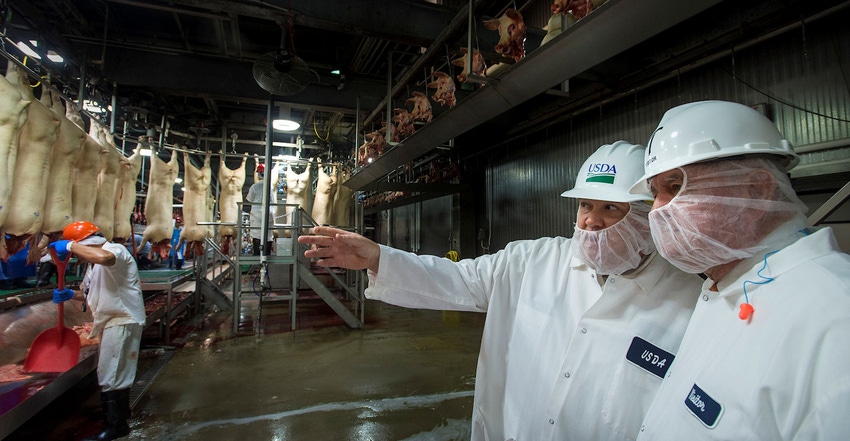OMB advances hog inspection slaughter rule
USDA could publish final rule modernizing swine inspection any day.

On Friday, the Office of Management & Budget (OMB) finished its review of the final hog slaughter inspection rule and sent it back to the U.S. Department of Agriculture for final publication in the Federal Register. The rule has been supported by the pork industry. Activist groups, however, state that the proposal could increase food safety and animal welfare concerns.
In February 2018, following a 20-year evaluation in five market hog establishments, USDA’s Food Safety & Inspection Service (FSIS) put forth a proposed rule, thus beginning a full and transparent notice-and-comment rule-making process. The proposed rule includes a voluntary, opt-in inspection system, called the New Swine Slaughter Inspection System (NSIS), for market hog establishments and separate mandatory testing requirements for all swine establishments.
For market hog establishments that opt into NSIS, the proposed rule would increase the number of offline USDA inspection tasks while continuing 100% carcass-by-carcass FSIS inspection. These offline inspection tasks place inspectors in areas of the production process where they can perform critical tasks that have a direct impact on food safety.
FSIS noted that on April 3, 2019, The Washington Post published a story, titled “Pork Industry Soon Will Have More Power over Meat Inspections,” in which it decided to reprint the talking points of special interest groups while claiming that the agency declined interview requests. “The Washington Post knows full well that as a federal regulatory agency, FSIS cannot litigate or conduct rule-making through the media, yet The Post wants to try the agency in the court of public opinion,” FSIS said in a statement following the release of the article.
“This proposal and the research supporting it spans two decades. The work of FSIS to modernize inspection spans the last four presidential administrations,” FSIS added.
Food & Water Watch criticized OMB’s advancement of the rule, claiming that the privatization of hog slaughter inspections would remove up to 40% of trained inspectors from slaughter lines and replace them with company employees who are not required to be trained.
“FSIS is not reducing the total number of federal inspectors by 40% and is not replacing our inspection personnel with plant employees that will conduct inspections,” FSIS said in April. “FSIS will make inspection staff determinations on a case-by-case basis to ensure that 100% inspection and other critical public health activities are carried out. Should the proposed rule become final, federal inspectors won’t be performing quality assurance tasks. Instead, they would be able to focus on critically important activities.”
Earlier this month, Sen. Jeff Merkley (D., Ore.) and Rep. Rosa DeLauro (D., Conn.) sent a letter to the Office of Inspector General (OIG) asking for the current audit of the rule to be expanded to include animal welfare and safety concerns. Additionally, the House included a provision in the fiscal 2020 Agriculture Appropriations bill to block funding for implementation of NSIS until OIG has provided findings on serious concerns with FSIS as well as both House and Senate appropriations committees. It also mandates that FSIS fully address and resolve the issues raised by OIG in order for the rule to proceed.
“If the USDA’s final rule on pig slaughter mirrors the proposed rule, which, among other things, removes all restrictions on slaughter line speeds, it will harm vulnerable pigs, who will be rushed through the slaughter process by already taxed plant workers,” said Ingrid Seggerman, director of regulatory policy for the American Society for the Prevention of Cruelty to Animals. “It is irresponsible for the OMB to release this misguided proposal while USDA’s own Inspector General is still in the middle of examining deficiencies with the data the agency relied on to design the rule, and we urge USDA to abandon this dangerous proposal.”
NSIS, currently under review by OMB, is endorsed by the National Association of Federal Veterinarians, the National Pork Producers Council (NPPC) noted. “Federal veterinarians play an integral role in ensuring our national food safety, and their expertise makes certain that best practices are in place across multiple phases of our food production system. Their endorsement highlights the strong science and research used in designing the NSIS,” NPPC said in an issue statement.
NPPC said it strongly supports the proposed NSIS. “This program will increase efficiency and effectiveness of the federal inspection process, allow for the rapid adoption of new food safety technologies in pork slaughter and has the potential to increase U.S. harvest capacity,” NPPC said.
About the Author(s)
You May Also Like





